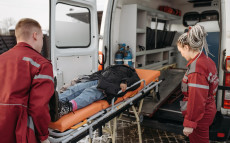- pathfindersAI
- Job Profile
Psychiatric Technicians
Summary
The Role of Psychiatric Technicians: An In-Depth Exploration
What They Do
Psychiatric Technicians serve as critical pillars in the mental health care system. These dedicated professionals work closely with individuals who have mental illnesses or developmental disabilities, providing essential care and support. Their tasks range from administering medication and monitoring vital signs to assisting in therapeutic activities and ensuring a safe environment for patients. Whether in hospitals, residential facilities, or community mental health centers, Psychiatric Technicians play a pivotal role in the holistic treatment and well-being of their patients.
Job Responsibilities
The responsibilities of a Psychiatric Technician are multifaceted and demand a compassionate, detail-oriented approach. Key duties include observing and recording patient behavior, leading group therapy sessions, and providing crucial one-on-one support. These technicians often work under the supervision of licensed psychiatrists, psychologists, and registered nurses, carrying out orders and reporting any significant changes in patients’ conditions. In addition, they may assist in the development and implementation of treatment plans. Ensuring patient safety by restraining individuals when necessary, following strict protocols, and providing crisis intervention are also essential tasks. The role requires continuous engagement with patients, often involving physical activities, personal care, and emotional support.
Essential Skills
To excel as a Psychiatric Technician, several essential skills are imperative. Strong interpersonal and communication skills are vital, enabling technicians to build rapport, understand patient needs, and effectively convey information to the medical team. Emotional resilience and patience are crucial, as the role often involves working with challenging behaviors and high-stress situations. Technical skills, such as proficiency in medical software and understanding of psychiatric assessment tools, are also important. Furthermore, the ability to work both independently and as part of a collaborative team is essential for ensuring comprehensive patient care. Critical thinking and problem-solving skills empower technicians to make quick, sound decisions in tight situations, enhancing the overall effectiveness of treatment.
Educational Pathways
Aspiring Psychiatric Technicians must embark on a specialized educational journey. While the minimum requirement for entry-level positions is typically a high school diploma or GED, many employers prefer candidates with postsecondary education. Certificate programs, often available at community colleges, provide focused training, covering subjects like psychology, psychiatric nursing, and mental health care. These programs usually include supervised clinical experience, offering hands-on learning opportunities. For those aiming to advance their careers, obtaining an Associate’s Degree in Psychiatric Technology or a related field can be beneficial. Some states also require licensure, which mandates passing a certification exam and completing continual education to stay updated with the latest practices and regulations in the field.
Career Prospects
The demand for Psychiatric Technicians is projected to grow, driven by an increasing awareness of mental health issues and the expanding need for comprehensive mental health care services. Employment opportunities are diverse, spanning across psychiatric hospitals, residential care facilities, outpatient clinics, and correctional institutions. As the mental health care landscape evolves, there are ample opportunities for career advancement. Experienced technicians can progress to supervisory roles, specializing in areas such as substance abuse, geriatrics, or pediatric mental health. Continuing education and certification can further enhance job prospects, potentially leading to roles in psychiatric nursing or other advanced healthcare positions.
Conclusion
In conclusion, the role of Psychiatric Technicians is both challenging and rewarding, offering a unique blend of responsibilities and opportunities in the mental health care domain. Those who choose this career path must possess a blend of technical proficiency, emotional intelligence, and resilience. With appropriate educational credentials and a commitment to professional growth, Psychiatric Technicians can look forward to a dynamic and impactful career. The ongoing evolution of mental health care ensures that these professionals will continue to be in high demand, providing invaluable services to individuals and communities alike. By dedicating themselves to the care and support of some of the most vulnerable populations, Psychiatric Technicians make a profound difference in the lives of their patients, embodying the essence of compassionate care and professional excellence.
Video
Compensation
| State | Median Salary | Median Hourly | Positions |
|---|---|---|---|
| AL | 31,730 | 15.26 | 2,040 |
| AK | 47,980 | 23.07 | 410 |
| AZ | 41,170 | 19.79 | 6,940 |
| AR | 31,830 | 15.30 | 1,030 |
| CA | 65,200 | 31.34 | 9,650 |
| CO | 43,080 | 20.71 | 990 |
| CT | 49,640 | 23.87 | 1,130 |
| DE | 37,930 | 18.24 | 120 |
| DC | 60,530 | 29.10 | 460 |
| FL | 38,550 | 18.53 | 12,300 |
| GA | 46,070 | 22.15 | 1,610 |
| HI | 50,560 | 24.31 | 1,660 |
| ID | 38,400 | 18.46 | 1,200 |
| IL | 46,890 | 22.54 | 5,600 |
| IN | 38,310 | 18.42 | 5,400 |
| IA | 36,710 | 17.65 | 480 |
| KS | 37,230 | 17.90 | 1,360 |
| KY | 36,050 | 17.33 | 810 |
| LA | 29,780 | 14.32 | 1,590 |
| ME | 41,910 | 20.15 | 440 |
| MD | 40,010 | 19.24 | 640 |
| MA | 46,580 | 22.39 | 1,760 |
| MI | 37,240 | 17.90 | 5,390 |
| MN | 44,330 | 21.31 | 1,600 |
| MS | 29,910 | 14.38 | 640 |
| MO | 36,780 | 17.68 | 3,720 |
| MT | 32,140 | 15.45 | 270 |
| NE | 52,000 | 25.00 | 1,070 |
| NV | 46,320 | 22.27 | 1,190 |
| NH | 46,970 | 22.58 | 120 |
| NJ | 56,040 | 26.94 | 1,060 |
| NM | 36,240 | 17.43 | 500 |
| NY | 52,310 | 25.15 | 2,380 |
| NC | 39,020 | 18.76 | 4,480 |
| ND | 37,120 | 17.85 | 170 |
| OH | 35,940 | 17.28 | 1,950 |
| OK | 32,350 | 15.55 | 1,470 |
| OR | 47,650 | 22.91 | 1,270 |
| PA | 39,460 | 18.97 | 5,880 |
| RI | 41,940 | 20.16 | 590 |
| SC | 36,740 | 17.66 | 450 |
| TN | 33,330 | 16.03 | 3,030 |
| TX | 37,070 | 17.82 | 9,820 |
| UT | 38,040 | 18.29 | 1,810 |
| VT | 46,140 | 22.18 | 460 |
| VA | 40,830 | 19.63 | 3,440 |
| WA | 48,760 | 23.44 | 970 |
| WV | 28,590 | 13.75 | 520 |
| WI | 40,310 | 19.38 | 3,950 |
Similar Occupations
In this area you will find other occupations that are close to the one you were viewing in tasks, knowledge and work environment. If the primary job profile you are viewing isn't quite to your liking, take a look around and see what else is available.
Basic and Premium Accounts have more alternative occupations available than the Free account.

Acute Care Nurses - 29-1141.01
Acute Care Nurses provide immediate and intensive care to patients with severe, life-threatening conditions, often working in environments such as emergency rooms, intensive care units, and surgical wards. They monitor vital signs, administer medications, and collaborate with multidisciplinary teams to ensure rapid and effective treatment.
-
$86,070/yr
Median Pay -
3,175,390
Number of Jobs

Paramedics - 29-2043.00
Paramedics are highly trained medical professionals who provide emergency care and transportation to individuals suffering from acute illnesses or injuries. They perform life-saving interventions on-site and during transit to hospitals, ensuring patients receive immediate and efficient medical attention.
-
$53,180/yr
Median Pay -
98,770
Number of Jobs